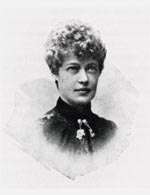Alma Åkermark

Alma Åkermark (1853-1933) was a Swedish editor, feminist, writer, journalist and women's rights activist. She was a co-founder of the radical feminist women's paper Framåt ('Forward'), and its editor during its entire publication. She wrote under the pseudonym Mark. She was active within the Gothenburg's Women's Association, and a leading figure within the most progressive and radical part of the Swedish and local women's rights movement, and was noted for her involvement in the Sedlighetsdebatten.
Life
Alma Åkermark was the daughter of a trader in Gothenburg. Her family was acquainted with the family of the progressive politician and publisher Sven Adolf Hedlund. When she lost her father at the age of sixteen, Hedlund gave her financial support to study music and drawing in Switzerland, a profession she supported herself by upon her return to Sweden.
Through the Hedlund family, she belonged to the progressive circles in Gothenburg. In 1884, the Gothenburg's Women's Association, the first women's organization in Gothenburg, was founded with Hedlund's daughter Mathilda Hedlund as chair. Åkermark was elected board member the following year. In 1886, Alma Åkermark, Hilma Angered-Strandberg and Mathilda Hedlund founded the women's publication Framåt ('Forward'), with Åkermark as editor and the women's association as publisher.
Alma Åkermark was a radical social liberal who supported social reforms and encouraged the paper to be a center of public debate. She controversially participated in the contemporary Sedlighetsdebatten about sexual double standards between women and men, in which she supported the side that women should be allowed sexual relations outside of marriage, similarly as men were, without being socially ostracized. Her publication of articles with sexual content in the women's paper placed her in confrontation with the moderate women's movement.
In 1886, she published the novel Pyrrhussegrar ('Pyrrhic Victories') by Stella Kleve, in which a dying, virtuous woman regretted having refused sexual pleasure because of social convention. The book caused a scandal as it collided with contemporary sexual double standards, and the paper lost its support from the women's association, though the chair, Mathilda Hedlund, did support her personally. With the support of the Hedlund family, Alma Åkermark managed to continue publishing the paper herself.
Framåt, however, eventually proved to be too radical and controversial for its time. In 1889, the paper discontinued publication when an organized advertising boycott deprived it of its finances, and Alma Åkermark lost her work as a teacher. She left Gothenborg with her spouse, the telegrapher Breinholm, and started a new magazine in Nystad in Finland, Nya Tag ('New Efforts'), which only lasted four months. After the death of her spouse, she returned to Gothenburg, where she was placed in a mental asylum. Upon her release, she left for the United States, where she lived for a couple of years. She returned to Sweden in 1909.
References
- http://www.ub.gu.se/kvinn/portaler/kvinnotidskrifter/biografier/akermark.xml
- Bergenheim, Åsa, Alma, sedligheten och det fria ordet. Ingår i: Obemärkta. - Stockholm, 1995. S. 162-198.
- Hirn, Yrjö, Alma Breinholm-Åkermark. - Ingår i: Den förgyllda balustraden. Stockholm, 1953. S. 25-58.
- Nyström, Per, Bannlyst: Alma Åkermark och det moderna genombrottet. Ingår i: Tre kvinnor mot tiden. Stockholm, 1994. S. 167-187.
- Kvinnornas tidning nr 17, 1925